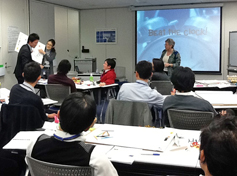I spent a couple of days working with a client’s leadership team on creating a new vision and strategy for learning in their organization. It was a gathering of key team leaders; what others might call committee chairs. These are the volunteers in the trenches, doing the work that results in the association’s various activities.
In working with this client over about 18 months, we’d been building towards presenting to the board of directors an over-arching vision and strategy for member learning that supports the organization’s established strategic framework. This gathering was just the latest step in the process.
It was exciting to see this small, relatively young association embrace the future of learning in examining its own operating environment in context with today’s learning revolution. While these volunteer and staff leaders acknowledge the association’s limitations, they haven’t let those limitations inhibit their thinking. “Oh, we don’t have the resources to do that next year? Maybe we will in a few years.” They’re seeking to build a bold vision they can implement in small steps as resources become available.
What was exciting to me is that this association is developing a vision and strategy for learning that goes well beyond the traditional, somewhat narrow focus that learning in associations consists only of events like conferences and webinars. They aren’t trying to figure out how to Continue reading →
This post is cross-posted on the ATD Learning & Development Blog. It’s also the first in a series on coaching and working with subject-matter experts.
Sometimes, it seems like “SME” is a four-letter word.
Love ’em or hate ’em, though, you need your subject-matter experts. Whether they’re just content providers or also lead learning opportunities, working with SMEs can be challenging. Your priorities aren’t theirs. Missed deadlines, inadequate facilitation skills, and “interesting” ideas about what effective learning looks like are common. Even if some are dedicated and know what they’re doing, the result is inconsistency for learners. Sound familiar?
Learning opportunities are at their best when a solid, productive partnership exists between learning professionals and subject-matter experts. Learning expertise plus content expertise, focused on what is best for learners, is a powerful combination.
The key that opens everything up is having a quality relationship. A great relationship built on trust and mutual respect allows you and your SMEs to focus less time and effort battling each other and more on meeting learner needs. And it all starts with you. Continue reading →
One of my favorite things about the work I do is the new experiences I get to enjoy – and especially the new things I learn from them!
I once spent 10 days in Asia working with a corporate client. The first half of the trip was my second delightful visit to Singapore; I was there the previous year for this same client. The second half was a little more adventurous: my first trip to Tokyo, Japan and to a country where English is not the predominant language.

My workshop in Tokyo
My client, based in Singapore, worked with a multi-country network of people who train her company’s sales consultants on how to sell and use its highly technical products. In both Singapore and Tokyo, I led a two-day workshop that focused on transforming those subject-matter experts (SMEs) into “facilitators of learning.” That is, participants would learn how to design and lead programs that actively engage learners and enhance their abilities to apply what they’ve learned.
Some things I learned (or confirmed) along the way….
• Leading learning in a country other than your own adds another, potentially significant, layer to preparation and planning.
Knowing your audience is a key tenet of adult learning; in another country, you also have to become familiar with that audience’s culture. Knowing what to do – and what not to do – can help avoid potential gaffes and demonstrate thoughtfulness and consideration to your hosts. And it helps you determine what changes you may have to make to the program to suit learning approaches to the audience.
Be careful about relying only on the Internet or “book learning.” Cultivate local relationships; at the very least, talk to others who have worked in the target country to get a better sense of what to expect. Don’t expect to just transplant your professional development opportunities to another culture “as is.” At the same time, don’t assume things will have to be significantly different, because… Continue reading →
